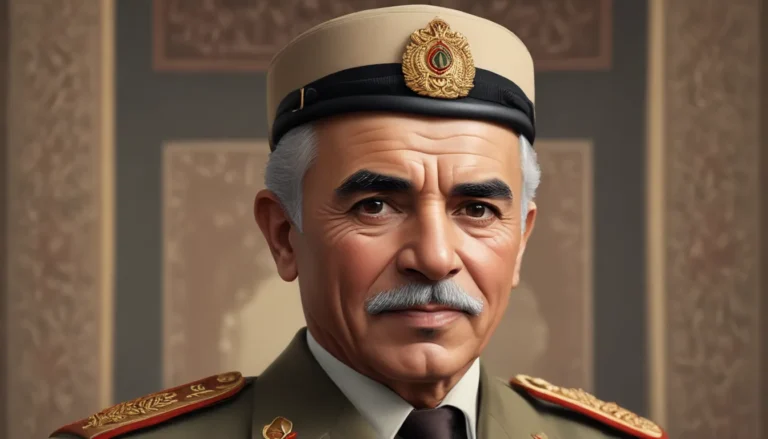The images in our articles may not match the content exactly. They are used to grab your attention, not to show the exact details in the text. The images complement the text but do not replace it.
Kim Dae-jung, a prominent figure in South Korean history, has left an indelible mark on the nation through his extraordinary achievements and contributions. From being the 8th President of South Korea to receiving the Nobel Peace Prize, his legacy is deeply ingrained in the fabric of the country. Despite facing numerous challenges, Kim Dae-jung’s unwavering determination and remarkable leadership skills allowed him to overcome adversity and make a lasting impact. In this article, we will delve into eight extraordinary facts about Kim Dae-jung, shedding light on his remarkable journey, accomplishments, and the mark he left on the history of South Korea.
The Nobel Peace Prize Laureate
Kim Dae-jung was awarded the Nobel Peace Prize in 2000 for his efforts to promote democracy and reconciliation in South Korea. His dedication to achieving peace on the Korean Peninsula earned him international recognition and respect. Through his tireless work towards peace and democracy, Kim Dae-jung solidified his position as a revered leader both in South Korea and on the global stage.
The 8th President of South Korea
Serving as the President of South Korea from 1998 to 2003, Kim Dae-jung’s presidency was marked by his commitment to democratization, inter-Korean relations, and economic reforms. His steadfast dedication to these principles earned him the nickname “The Great Democrat,” showcasing his unwavering belief in the power of democracy to drive positive change.
Pioneering the Sunshine Policy
One of Kim Dae-jung’s most significant contributions was the implementation of the Sunshine Policy, a diplomatic approach aimed at improving relations between North and South Korea. His efforts included a historic summit with North Korean leader Kim Jong-il in 2000, laying the foundation for peace talks and cooperation between the two nations. Through the Sunshine Policy, Kim Dae-jung demonstrated his commitment to fostering peace and reconciliation in the region.
Surviving Adversity: The Assassination Attempt
In 1973, Kim Dae-jung narrowly escaped an assassination attempt during a visit to Japan. Despite the grave threat to his life, he continued to champion democracy and human rights, becoming a symbol of resilience and determination for the Korean people. Kim Dae-jung’s courage in the face of adversity further solidified his reputation as a leader willing to risk everything for the ideals he believed in.
Champion of Democracy: Time in Prison
Throughout his political career, Kim Dae-jung faced multiple arrests and imprisonments for his unwavering opposition to authoritarian regimes. His steadfast commitment to democracy and human rights led to periods of imprisonment, but also cemented his status as a prominent figure in the fight for social justice. Kim Dae-jung’s resilience in the face of oppression serves as a reminder of the enduring power of principles in the pursuit of a better society.
Economic Reforms and Progress
During his presidency, Kim Dae-jung implemented significant economic reforms aimed at improving the living standards of the Korean people. His administration focused on stimulating economic growth through measures such as financial sector restructuring and labor market reforms. By prioritizing the well-being of his citizens, Kim Dae-jung demonstrated his holistic approach to governance, balancing economic progress with social welfare initiatives.
Awarded the United States Presidential Medal of Freedom
In 2001, Kim Dae-jung received the United States Presidential Medal of Freedom, one of the highest civilian honors in the country. This prestigious award symbolized the strong friendship between South Korea and the United States, as well as Kim Dae-jung’s contributions to peace and democracy. The recognition from the United States further underscored Kim Dae-jung’s significant impact on the global stage.
The Kim Dae-jung Library and Museum
In honor of his legacy, Kim Dae-jung established the Kim Dae-jung Library and Museum, serving as a tribute to his life and achievements. This institution preserves his legacy and promotes the values of peace, democracy, and human rights that Kim Dae-jung dedicated his life to upholding. Through the library and museum, future generations can learn from his extraordinary journey and continue to be inspired by his unwavering commitment to positive change.
FAQs
- When was Kim Dae-jung born and when did he pass away?
-
Kim Dae-jung was born on December 3, 1924, and passed away on August 18, 2009.
-
What is Kim Dae-jung well-known for?
-
Kim Dae-jung is renowned for his role in South Korea’s democracy movement, his presidency from 1998 to 2003, and his efforts towards reconciliation with North Korea through the Sunshine Policy.
-
What is the Sunshine Policy?
-
The Sunshine Policy was a diplomatic approach initiated by Kim Dae-jung aimed at promoting inter-Korean cooperation and peace through economic and cultural exchanges.
-
Did Kim Dae-jung receive any international recognition for his work?
-
Yes, Kim Dae-jung was awarded the Nobel Peace Prize in 2000 for his efforts to promote democracy and human rights in South Korea and for his reconciliation efforts with North Korea.
-
What is Kim Dae-jung’s lasting legacy?
- Kim Dae-jung’s lasting legacy includes his significant contributions to South Korean democracy, his efforts towards peace and reconciliation with North Korea, and his unwavering commitment to human rights and social justice.
Kim Dae-jung’s extraordinary life serves as a beacon of inspiration, demonstrating the immense impact one individual can have on shaping the course of history. His legacy of peace, democracy, and resilience continues to resonate with people around the world, inspiring generations to strive for positive change and uphold the values he embodied.
Explore more influential figures and ideas: Discover the legacy of U.S. presidents on our currency and their historical significance. Learn about the principles and advantages of democracy, a system Kim Dae-jung fervently advocated for. Lastly, delve into the life of another Nobel Peace Prize laureate, Yitzhak Rabin, whose efforts towards peace in the Middle East left an enduring mark on the global stage.
Your Feedback Matters
At the core of our mission is a dedication to delivering credible and captivating content that enriches your knowledge and understanding. Each factual detail on our platform is contributed by individuals like you, ensuring a diverse array of insights and information. Our team of editors rigorously reviews every submission to maintain the highest standards of accuracy and reliability, guaranteeing that the facts we share are not only intriguing but also authentic. Trust in our commitment to excellence as you engage in a journey of discovery and enlightenment with us.






